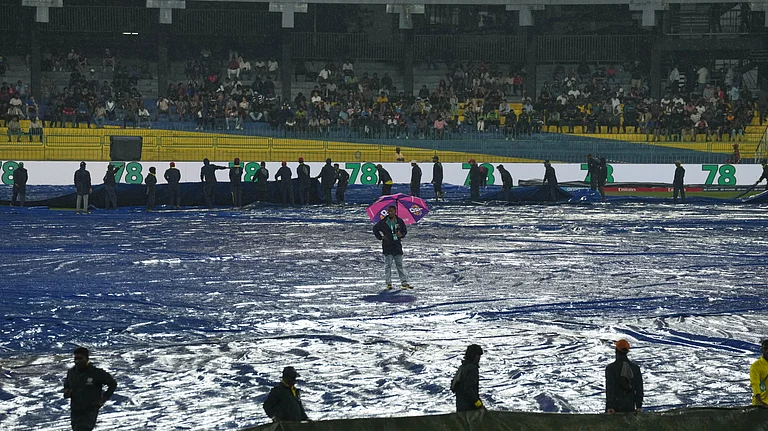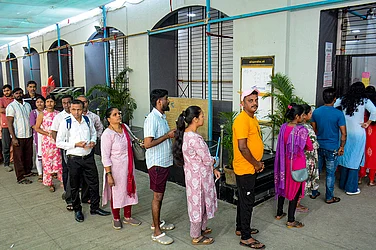Their ration cards, Aadhar cards, and voter IDs provide evidence of the now-demolished Priyanka Gandhi Camp as their home address. Jawans and Babus informed them that the land belongs to NDRF and perhaps for the sake of national security, they had to be rendered homeless.
“Well, you did not look like a slum dweller to me and hence, I rented my room to you,” a landlord subletting his house to an evicted family of the Priyanka Gandhi camp told the evictees.
Rendered homeless, after the National Disaster Rescue Force (NDRF), Delhi Development Authority (DDA), and Delhi Police evicted them from the Priyanka Gandhi camp in Vasant Vihar in the wee hours of June 16, hundreds of families continue to struggle for a roof over their heads. The demolitions, which started around 3 am in the morning and continued till late afternoon destroyed millennia of memories and uprooted everything that a community of daily wage earners domestic workers, and laborers built for themselves over decades.
Weeks have passed since the evictions but the sense of normalcy escapes this family. Distraught children, heartbroken old people, and helpless parents can't recall what exactly could be saved and what was lost under the rubble at their former homeland, PG Camp.
Sunita, a domestic worker lost her job as she did not show up at work for a few days after her home was razed. With four kids and an unemployed husband, her job is the only source of income in their household. Nearly 75 years old, Seeta Devi is forced to live on the third floor with her younger son, leaving behind what she had known as 'home' for almost the entirety of her life. Construction worker Renu had to move to the eighth floor of a building with barely any ventilation as their family could not afford two rooms on lower floors.
“The landlords count the number of slippers outside our rooms to establish if we have any visitors. They have prohibited even the kids from gathering in their homes or the lanes,” the evicted families rued. As in most demolished areas, landlords hiked rent around the time of evictions. “They raise the prices because they know we are desperate with no roof over our heads. This is also a way to ensure that they keep the poorest jhuggi walas outside their homes,” evictees highlight the organised caste and class-based seclusion practices of the upper castes with land ownership.
The NDRF argued in the court that it was crucial to evict these families, who claim to be living on the land for over two generations citing "national security" reasons. With no financial ad social security and an average monthly income of Rs10,000 to Rs 20,000, the evicted families are now paying a rent of Rs 4,000 to Rs 7,000 for a mere one-room set and shared or no toilets at all. Many have gone back to their native villages in other states and some continue wandering in the different localities of the national capital, seeking to find an affordable place close to work. Some quit their work in the posh locality of Vasant Vihar to get jobs in localities with comparatively affordable rentals.
The dark, humid, and suffocating one-room in Buddha Vihar was rented by Roshni Mandal and her husband after they lost their home on the fateful morning of June 16. The family of five includes a teenage daughter. “There is a massive cockroach infestation in this room where we sit, sleep, cook, and eat. They are everywhere and often crawl over us as we sleep. Though I am cautious with the food, my daughter refuses to eat,” she says. 34-year-old Roshni is a domestic worker, mother of two, and also a foster mother. She was amongst those detained on the day of the demolitions. Her husband, Mandal is a daily wage laborer working as a white washer. During good times, the two collectively earn a total of Rs 15 to 17 thousand monthly.
“My 17-year-old daughter has started to understand our financial difficulties. But as you can see, there is no air or ventilation here, she goes to the terrace on the fourth floor every day and looks at the houses with balconies. Yesterday, she requested me to move to a house with a balcony, but we are paying Rs 6,000 for this place already and can’t afford to move to an even more expensive one,” the Mandals say.
Most families invested their entire life savings, penny by penny to build their dream houses. Relations have changed as the cruel fate had it. Previously neighbours who'd often quarrel with each other, now find solace in one other's arms as they share the sense of collective loss and mourn an indescribable pain. “Earlier we wouldn't see eye to eye, but as we ran into each other this morning, we hugged and broke down,” says Roshni referring to her former neighbour.
National Security Over Nationale’s Security
Most families, now evicted from the PG Camp, close to the posh locality of Vasant Vihar have been living here for over two generations. Many of them claim that their ancestors have resided on this land since 1982. Their ration cards, Aadhar cards, and most important of all, voter IDs provide the now-demolished PG Camp as their address proof. Year after year, they have paid their electricity bills. However, Babus and Jawans have made it clear to them that the land belongs to the NDRF and they are nothing but ‘encroachers.’
The NDRF and DDA argued in the courts that the demolition was a necessity for "national security”. The authorities instructed the families to live in rain baseras (night shelter homes) by government and non-government organisations built for the homeless. The current capacity of these night shelters is estimated at around 16,000, however in the past couple of months, as MCD razes one locality after another with the G20 summit closing in, over 2,50,000 individuals have apparently become homeless in Delhi, 15 times the capacity of the night shelters.
First-generation learner of his family, 17-year-old Yash (name changed) has dropped out of school to support his family after they lost their home, as well as hopes for a better future. Clouds of doubt hover above the future of other adolescents his age, who just graduated out of high school and planned on enrolling in colleges.
Young adolescents and women are forced to use sulabh shauchalayas after losing their homes. “We had built toilets in each of our houses without any help from the government, now we have to use the public toilet, no matter the time,” the evictees say. “We are scared of using the toilets in the middle of the night as there are drunkards and criminals roaming about at night,” the adolescents say.
The MLAs and politicians who made promises of “Jahan Jhuggi Wahan Makaan” and assured their unconditional support to the now homeless families have been missing from the scene since the demolitions. All attempts of meeting with their political representatives have been in vain as they are told that their MLA, Pramila Tolkas is out of town or asked if they have an appointment. “Did they seek our permission when they came to our homes to ask for our votes? Why did they encourage us to build concrete homes when we were content living under asbestos and tarpaulins? Our only worth to them is our votes,” their anger comes from the pain and helplessness the administration and government have pushed them into.
As we reached the demolition site, the locals repeatedly warned us of the NDRF officials and jawans who had detained activists, locals and even journalists on the day of the locations. "They have barred us from the eviction land and said that they will shoot us at sight if we were to go there." They also share that it was the politicians and MLAs who, during election campaigns frequented their basti and encouraged them to build concrete homes on the site. However, the only party who lost it all and stand behind the witness box against the questions and fingers raised at them are the evictees; a community of daily wage earners, domestic workers and first-generation learners.


























